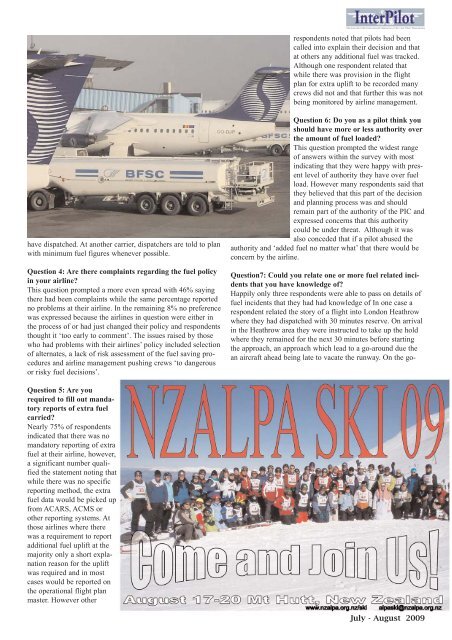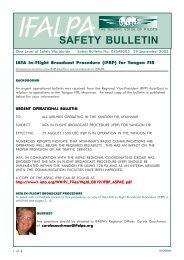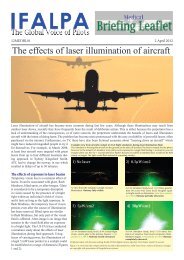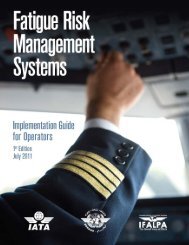You also want an ePaper? Increase the reach of your titles
YUMPU automatically turns print PDFs into web optimized ePapers that Google loves.
have dispatched. At another carrier, dispatchers are told to plan<br />
with minimum fuel figures whenever possible.<br />
Question 4: Are there complaints regarding the fuel policy<br />
in <strong>your</strong> airline?<br />
This question prompted a more even spread with 46% saying<br />
there had been complaints while the same percentage reported<br />
no problems at their airline. In the remaining 8% no preference<br />
was expressed because the airlines in question were either in<br />
the process of or had just changed their policy and respondents<br />
thought it ‘too early to comment’. The issues raised by those<br />
who had problems with their airlines’ policy included selection<br />
of alternates, a lack of risk assessment of the fuel saving procedures<br />
and airline management pushing crews ‘to dangerous<br />
or risky fuel decisions’.<br />
Question 5: Are you<br />
required to fill out mandatory<br />
reports of extra fuel<br />
carried?<br />
Nearly 75% of respondents<br />
indicated that there was no<br />
mandatory reporting of extra<br />
fuel at their airline, however,<br />
a significant number qualified<br />
the statement noting that<br />
while there was no specific<br />
reporting method, the extra<br />
fuel data would be picked up<br />
from ACARS, ACMS or<br />
other reporting systems. At<br />
those airlines where there<br />
was a requirement to report<br />
additional fuel uplift at the<br />
majority only a short explanation<br />
reason <strong>for</strong> the uplift<br />
was required and in most<br />
cases would be reported on<br />
the operational flight plan<br />
master. However other<br />
respondents noted that pilots had been<br />
called into explain their decision and that<br />
at others any additional fuel was tracked.<br />
Although one respondent related that<br />
while there was provision in the flight<br />
plan <strong>for</strong> extra uplift to be recorded many<br />
crews did not and that further this was not<br />
being monitored by airline management.<br />
Question 6: Do you as a pilot think you<br />
should have more or less authority over<br />
the amount of fuel loaded?<br />
This question prompted the widest range<br />
of answers within the survey with most<br />
indicating that they were happy with present<br />
level of authority they have over fuel<br />
load. However many respondents said that<br />
they believed that this part of the decision<br />
and planning process was and should<br />
remain part of the authority of the PIC and<br />
expressed concerns that this authority<br />
could be under threat. Although it was<br />
also conceded that if a pilot abused the<br />
authority and ‘added fuel no matter what’ that there would be<br />
concern by the airline.<br />
Question7: Could you relate one or more fuel related incidents<br />
that you have knowledge of?<br />
Happily only three respondents were able to pass on details of<br />
fuel incidents that they had had knowledge of In one case a<br />
respondent related the story of a flight into London Heathrow<br />
where they had dispatched with 30 minutes reserve. On arrival<br />
in the Heathrow area they were instructed to take up the hold<br />
where they remained <strong>for</strong> the next 30 minutes be<strong>for</strong>e starting<br />
the approach, an approach which lead to a go-around due the<br />
an aircraft ahead being late to vacate the runway. On the go-<br />
July - August 2009





